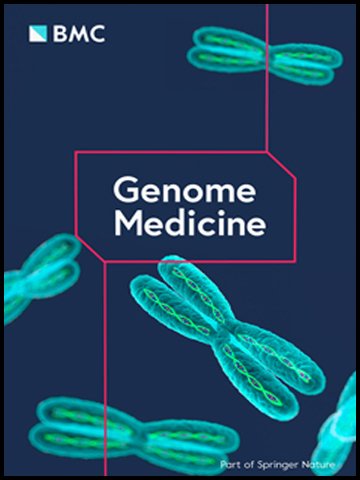Burden of Mendelian disorders in a large Middle Eastern biobank
IF 10.4
1区 生物学
Q1 GENETICS & HEREDITY
引用次数: 0
Abstract
Genome sequencing of large biobanks from under-represented ancestries provides a valuable resource for the interrogation of Mendelian disease burden at world population level, complementing small-scale familial studies. Here, we interrogate 6045 whole genomes from Qatar—a Middle Eastern population with high consanguinity and understudied mutational burden—enrolled at the national Biobank and phenotyped for 58 clinically-relevant quantitative traits. We examine a curated set of 2648 Mendelian genes from 20 panels, annotating known and novel pathogenic variants and assessing their penetrance and impact on the measured traits. We find that 62.5% of participants are carriers of at least 1 known pathogenic variant relating to recessive conditions, with homozygosity observed in 1 in 150 subjects (0.6%) for which Peninsular Arabs are particularly enriched versus other ancestries (5.8-fold). On average, 52.3 loss-of-function variants were found per genome, 6.5 of which affect a known Mendelian gene. Several variants annotated in ClinVar/HGMD as pathogenic appeared at intermediate frequencies in this cohort (1–3%), highlighting Arab founder effect, while others have exceedingly high frequencies (> 5%) prompting reconsideration as benign. Furthermore, cumulative gene burden analysis revealed 56 genes having gene carrier frequency > 1/50, including 5 ACMG Tier 3 panel genes which would be candidates for adding to newborn screening in the country. Additionally, leveraging 58 biobank traits, we systematically assess the impact of novel/rare variants on phenotypes and discover 39 candidate large-effect variants associating with extreme quantitative traits. Furthermore, through rare variant burden testing, we discover 13 genes with high mutational load, including 5 with impact on traits relevant to disease conditions, including metabolic disorder and type 2 diabetes, consistent with the high prevalence of these conditions in the region. This study on the first phase of the growing Qatar Genome Program cohort provides a comprehensive resource from a Middle Eastern population to understand the global mutational burden in Mendelian genes and their impact on traits in seemingly healthy individuals in high consanguinity settings.中东大型生物库中孟德尔疾病的负担
对来自代表性不足的祖先的大型生物库进行基因组测序,为在世界人口水平上检测孟德尔疾病负担提供了宝贵的资源,是对小规模家族研究的补充。在这里,我们研究了来自卡塔尔的 6045 个全基因组,卡塔尔是一个具有高近亲繁殖率和突变负担研究不足的中东人群,该人群加入了国家生物库,并对 58 个临床相关的数量性状进行了表型分析。我们检查了来自 20 个面板的 2648 个孟德尔基因,注释了已知的和新的致病变异,并评估了它们的渗透性及其对测量性状的影响。我们发现,62.5% 的参与者是至少一种与隐性疾病相关的已知致病变异体的携带者,150 名受试者中就有 1 人(0.6%)是同源变异体,其中半岛阿拉伯人比其他血统的人特别多(5.8 倍)。平均每个基因组发现 52.3 个功能缺失变异,其中 6.5 个影响已知的孟德尔基因。一些在 ClinVar/HGMD 中被注释为致病的变异在该队列中出现的频率处于中等水平(1%-3%),凸显了阿拉伯始祖效应,而另一些变异出现的频率极高(> 5%),促使人们重新考虑将其视为良性变异。此外,累积基因负担分析显示,56 个基因的基因携带者频率大于 1/50,其中包括 5 个 ACMG 3 级面板基因,这些基因将成为该国新生儿筛查的候选基因。此外,利用 58 个生物库性状,我们系统地评估了新型/罕见变异对表型的影响,发现了 39 个与极端数量性状相关的候选大效应变异。此外,通过罕见变异负荷测试,我们发现了 13 个突变负荷较高的基因,其中 5 个对代谢紊乱和 2 型糖尿病等疾病相关性状有影响,这与该地区这些疾病的高发病率相符。这项对不断扩大的卡塔尔基因组计划队列第一阶段的研究提供了来自中东人群的全面资源,有助于了解孟德尔基因的全球突变负荷及其对高近亲繁殖环境中看似健康的个体的性状的影响。
本文章由计算机程序翻译,如有差异,请以英文原文为准。
求助全文
约1分钟内获得全文
求助全文
来源期刊

Genome Medicine
GENETICS & HEREDITY-
CiteScore
20.80
自引率
0.80%
发文量
128
审稿时长
6-12 weeks
期刊介绍:
Genome Medicine is an open access journal that publishes outstanding research applying genetics, genomics, and multi-omics to understand, diagnose, and treat disease. Bridging basic science and clinical research, it covers areas such as cancer genomics, immuno-oncology, immunogenomics, infectious disease, microbiome, neurogenomics, systems medicine, clinical genomics, gene therapies, precision medicine, and clinical trials. The journal publishes original research, methods, software, and reviews to serve authors and promote broad interest and importance in the field.
 求助内容:
求助内容: 应助结果提醒方式:
应助结果提醒方式:


